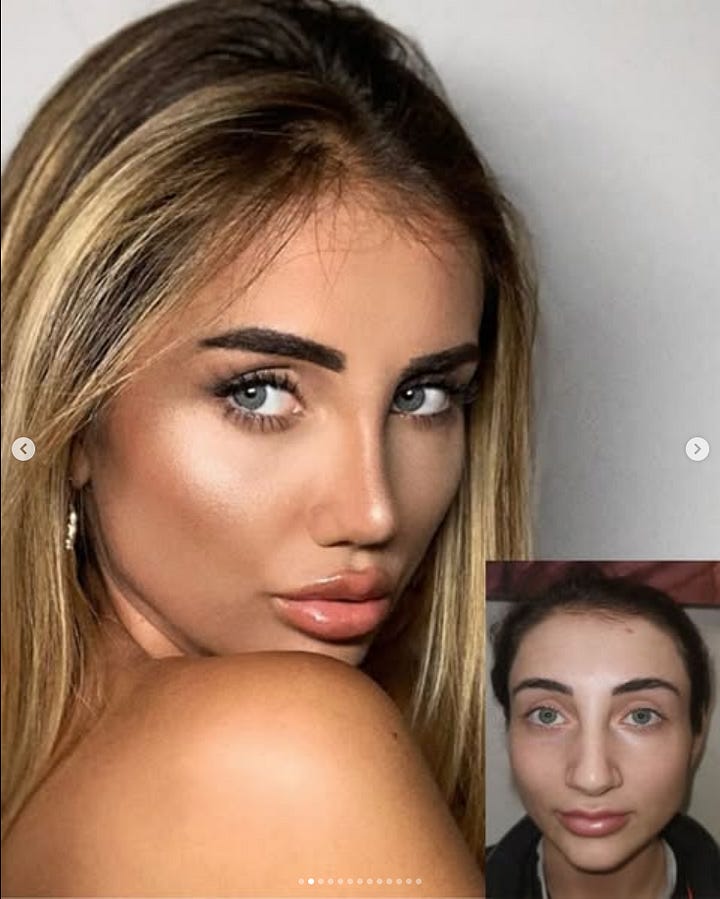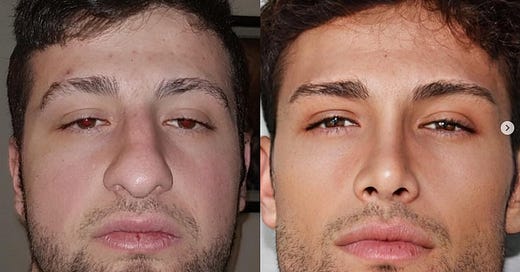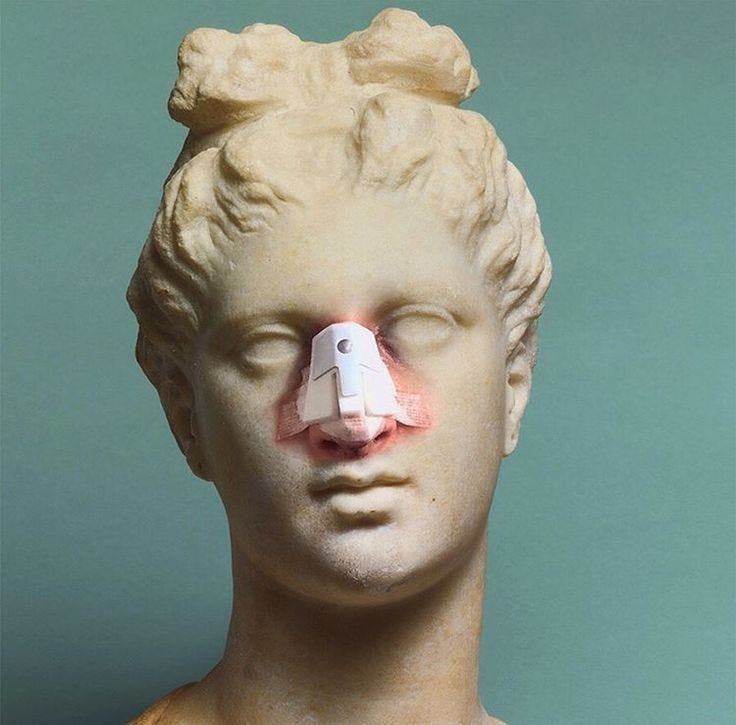A while ago, I was scrolling on my explore page on Instagram and stumbled upon a unique account called esteistanbul_.
It was run by a plastic surgery center in Turkey (surprise, surprise) that showed the before and after photos of their clients’ procedures. Some transformations showed minor alterations of a simple nose-job to others that showed the accumulation of multiple procedures that took up to six months to a year span. The transformations are quite mind-blowing.
Honestly, it made them look like a whole different person.
Here are some more if you still can’t believe your eyes.








This sudden hyper-stylized reality I saw on my Instagram got the wheels spinning in my head, and left me with one dire question:
What will the effects of potential widespread normalization and democratized physical alteration do to our society?
In the future, if someone feels insecure about a physical feature, do they see it as a flaw in their system, aiming to get rid of it?
Will it be so easy and accessible to do so, that they will? Any push-back by society? Any negative consequences to someone’s self-esteem?
Perhaps the most important question:
Just because we can redesign ourselves, does it mean we ought to?
Plastic surgery is no new thing, having roots going as far back as India in 600 BCE where the physician Sushruta developed techniques for working on the nose, lips, and ears.
Techniques slowly progressed as time went on in history, but World War I and II really sped things up. Technology in general had vastly gotten better, and soldiers with war injuries and disfigured faces needed solutions.
During the 1950s-70s plastic surgery grew from mainly being reconstructive-needed, to an elective cosmetic choice. Nose jobs, facelifts, and breast augmentations grew in popularity, and surgeons developed precise, safer techniques for these procedures. By the 90’s and 2000’s, there were all types of new services due to advancements in tech. Laser treatments, Botox, and minimally invasive procedures were democratized and less stigmatized. Speed up to the 2010s and plastic surgery became more mainstream compared to previous decades.
Now, in the 2020s, plastic surgery is in the public eye more than ever with people posting their results and procedures on social media. There even seems to be a new phase emerging in the industry: subtlety.
The NY Post has written an interesting article about the “quiet luxury” movement. Patients are moving away from drastic and extreme enhancements like the BBL and deep facelift for milder, subtle procedures like the “Midwest BBL” and the “soft” facelift.
Botox, dermal fillers, thread lifts, microneedling, laser treatments, and fat freezing (don’t ask) are also popular, softer options. They just quietly enhance your features or prevent a part of your physical aging while still looking natural.
So, where is plastic surgery going with the future?
AI and data science are going to cause significant change.
3D facial and outcome simulation will help patients visualize results before their surgery.
Digital twins (virtual models of your body) can track aging and simulate procedures.
AI-guided injectables and robotic precision tools will reduce risk and human error. (This will be beneficial for surgeries of all kinds.)
There also could be personalization to a person’s specific genetic makeup and hormones with,
“Smart” skincare that is linked to hormonal cycles.
Genetic editing which predicts age-related features.
Robust tools that can also predict aging patterns.
The main reason I wanted to write this article is because I was weighing what the effects of an easily, accessible cosmetic surgery industry would have on people in the far future.
Would this be more of a band-aid than a solution?
Let’s say we are in a future where you easily have the ability to change something that you are insecure about. You look in the mirror one day and think that your nose is shaped the wrong way, or that your hairline is too far back. Maybe you get slight teasing here and there from your friends about it. You go onto social media and see an influencer who seemingly has no physical flaws.
Envy and insecurity start to rear their ugly heads in your mind. What do you do?
Well, in the past you had limited, expensive, and stigmatized plastic surgery, so the only thing you could’ve done was fix your mindset around your self-doubt. Which in turn, built character. You had to accept that feature is part of who you are, and something you have no control over.
Although that route is harder and more painful, it actually might be better for you in the long run. In life, you are going to run into many things that you can’t control. Accept it—and give yourself some self-love, as they say.
But in the future, that difficult choice of accepting might just be an option. You will be able to go ahead and undergo the knife, and morph that physical part of yourself into something anew. Possibly as quick and easy as getting a haircut.
Maybe it seems therapeutic or empowering in the moment, but long-term, I wonder will happen to someone’s mental health. With this option, you are able to easily avoid dealing with the root problem.
What are the other side effects of this supposed empowerment?
Will it make a person more judgmental to others that have features that they deem “ugly”? Or perhaps, it will make you weaker when you face something that you can’t control? What if this leads to a slippery slope of alteration after alteration?
You keep on waking up each day never feeling good enough.
Never feeling satisfied.
Never perfect.
Hold on, hold on, hold on,
Let’s take a moment to slow down real quick.
I’ve been saying so far, that the danger is that people will in some way avoid an insecurity, because they will be able to physically alter themselves. But couldn’t you somehow argue the same with someone who is overweight, and exercises to lose that weight?
Person A has an insecurity—they think they are fat—and then follows a procedure or protocol over a period of time to physically change themselves, so that they are skinnier. This ideally should remove the insecurity and make them feel better.
At its core, is it not the same with plastic surgery?
Person B has an insecurity about themself, follows a procedure which physically alters a part of their body, and then ideally — insecurity should be gone making them feel more comfortable with themself.
The only difference is one uses technology, while the other uses natural methods like diet and exercise.
What about small enhancements that are more of a middle-ground of the two options I listed above? I myself use teeth-whitening toothpaste to get a whiter smile, and a face cleanser to make my face look clearer. This is modifying myself in some way with a form of developed innovation. It also helps me get over a small amount of insecurity about how my smile or face looks.
Couldn’t you also experience the same-after effects that I listed before when you lose weight or use teeth-whitening toothpaste?
Could it make a person more judgmental to others that have features that they deem “ugly” that they used to have? Or perhaps, it will make you weaker when you face something that you can’t control? What if this leads to a slippery slope of alteration after alteration?
Myself, the person who loses weight, and someone who gets plastic surgery can still run into the same problem of not feeling satisfied afterward, wanting more and more.
To make it clear, it can be very easy to be pessimistic and a fear-monger about the perceived danger of future technology — like with AI in the news right now.
But instead of looking at the future of plastic surgery with a doomerism perspective, let’s flip the script.
Let’s look at it through the lens of an optimist.
What if this increase in plastic surgery is beneficial in the long-term in some way?
If society get to a convergence point where anyone can become attractive, it won’t be as much of a factor anymore in daily life. Attractive genes and features are only desirable because, one, they signal healthiness, capability, and fertility and two, they stand out; either by being statistically rare or by sharply aligning with cultural beauty ideals. Now, none of these reasons will matter anymore because attractiveness is democratized. Anyone can easily look good if they choose to.
What could possibly happen is that if most people are clones of gigachads and Instagram models, the importance of viewing someone or selecting a partner will turn to other factors. Most likely, it will be your character.
The focus could shift to qualities that you can control, build, and earn — not ones that you can alright buy. Something like,
Emotional intelligence.
Sense of humor.
Purpose.
How you carry yourself as a person.
And who knows—maybe this possible shift is more positive for humanity. It will influence us to focus on attributes that we can control without technology, and grow us to be better partners and people.
Because at its core, isn’t it really about who we are underneath?
It’s easy to knock down the people who undergo transformations like the ones at the beginning of this article—but I don’t know what it is like to be any of them. I don’t live their day-to-day lives, and maybe their looks play a part in how people treat them or has created a powerful insecurity. An insecurity so deep, that it riddens them with terrible anxiety causing them to think about nothing else. If you and I felt those emotions they felt or dealt with people who judged us on our looks, wouldn’t we want to do something to stop it? Self-loathing is a hurtful and powerful emotion.
Whether we like it or not, how we look plays a big role in our society. From dating apps to daily interactions to social media, the halo effect is real. I personally think that because of the amount of time we spend on social media, plastic surgery as an option to change your looks will only get more popular from here.
In all honesty though, with regard to the long-term future, who really knows what’s going to happen.
Instead of being just pessimistic, it’s also good to be optimistic. That perspective matters as well, if not more.
“We can complain because rose bushes have thorns, or rejoice because thorns have roses.”
-Alphonse Karr
To end this article, I leave you with a YouTube comment I once read on a video discussing how potential technology in the far future would allow people to transform to anything that they wanted to. Whether it was changing race, physical structure, or even species! It echoes what I was saying near the end of this Substack.
“Patrick Stewart became the New captain in Star Trek in the 90's, and was heavily criticized at the time for being bald. He went on a chat show in Britain (its probably on YouTube), and was cheekily asked by the host, why the captain would be bald in an age where technology was so advanced that they had replicators and could control molecules.
Stewart answered: “Because in such an advanced society, it simply didn't matter anymore.”
He went on and explained, “If you can just press a button and you get all your hair back...who cares? It just isn’t important anymore. Likewise, if you can become anything, a 7 foot Hulk or a bodybuilder without putting in any effort to do so...then it will not be aspirational anymore. I think in such a society, people will just choose to be themselves, because that is the most authentic thing you can be.”
-@tentimetex on YouTube
See you next week,
-Justin
Song of the Week:
Spotify Link above and Apple Music Link here.











